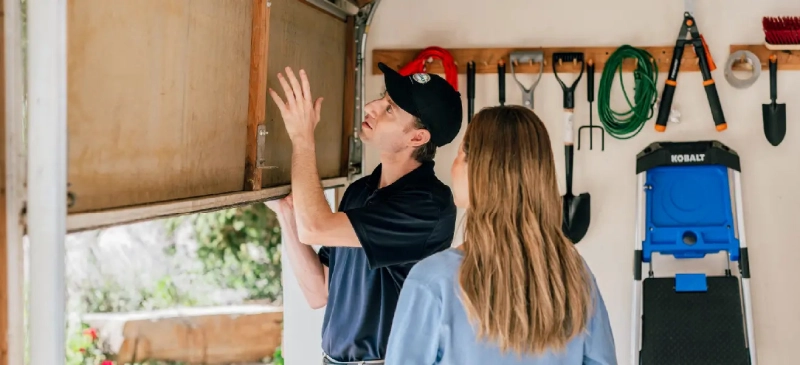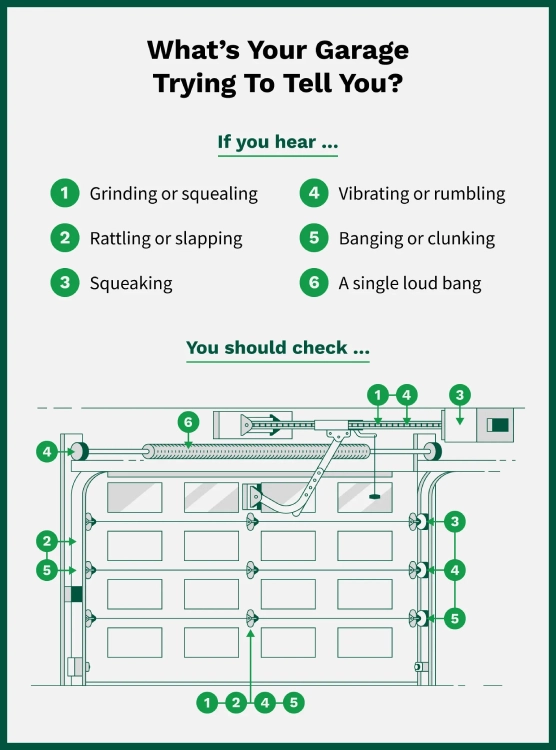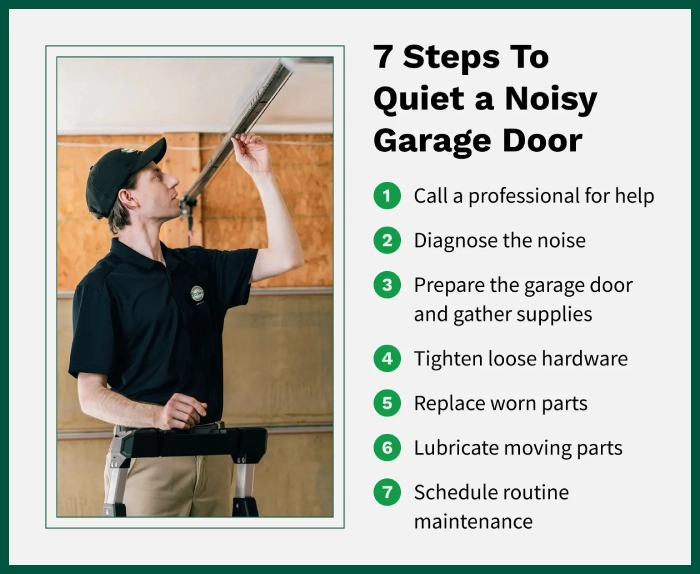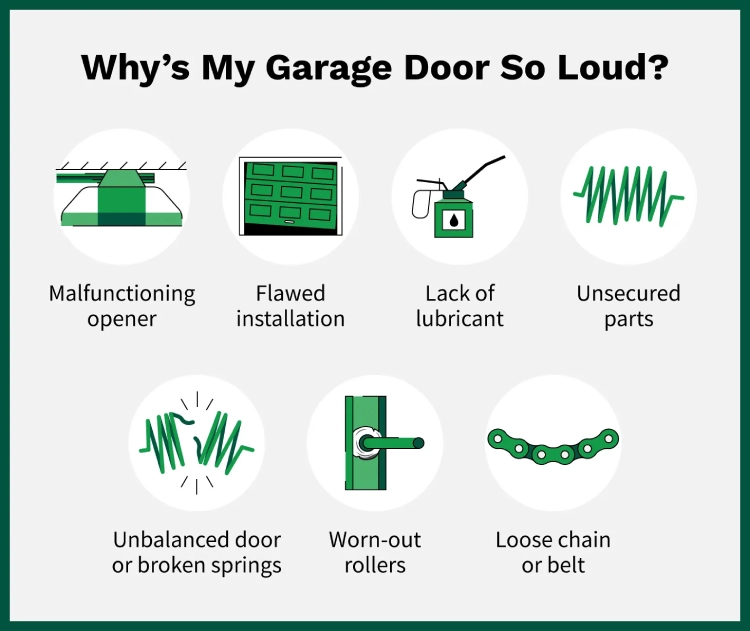
Garage door openers are convenient and important to maintain. When you notice your garage door is louder than normal, it’s more than annoying; it may signal that there’s something wrong. What could be making all that racket?
Call Precision Garage Door Service® to get to the bottom of it and fix your noisy garage door.
Table of Contents:
- Step One - Call a Professional
- Step Two - Diagnose the Noise
- Step Three - Prepare the Garage Door and Gather Supplies
- Step Four - Tighten Loose Hardware
- Step Five - Replace Worn Parts as Needed
- Step Six - Lubricate Moving Parts
- Step Seven - Maintain Your Garage Door Opener
- Additional Noise Reduction Tips
- 7 Reasons Why You Have a Noisy Garage Door
- Trust Precision Garage Door Service to Tame a Noisy Garage Door
- Noisy Garage Door FAQ
Step One - Call a Professional
If you’re dealing with a loud garage door, it’s always best to call a professional. Garage door repairs are generally dangerous, and a noisy door can indicate issues with the spring, cables, or other parts that have repair processes best left to the pros. When in doubt, consult with a professional to fix your noisy garage door without risking injury to yourself or others.
Request help with your garage door.
Step Two - Diagnose the Noise
No garage door is silent, but when you notice it’s louder than normal or making a new noise, it’s a sign something is wrong. When you request an appointment with Precision Garage Door Service, a service professional will listen carefully to diagnose the source of the problem. Different issues will cause different types of noises:
- Grinding or squealing noises signal that you may be dealing with worn rollers or hinges, or a loose chain on chain-drive openers.
- Rattling or slapping noises can mean loose hardware such as nuts, bolts, or screws on the door, tracks, or opener.
- Squeaking noises are usually indicative of a lack of lubrication on hinges, rollers, or other moving parts.
- Vibrating or rumbling noises might mean you have loose nuts, bolts, or screws on the opener, a loose opener belt on belt-drive openers, or worn bearings.
- Banging or clunking noises can alert to off-track doors, broken rollers, or hinges.
- A single loud bang typically means that your garage door spring snapped or detached.
Most of the noise a garage door makes comes from various metal-on-metal contact points located throughout the door’s operating system. For example, the bolts used to secure the hinges to the backside of the door can loosen themselves over time. They may rattle while the door is in motion and can contribute to the noise you are hearing.
These bolts should be snug but not too tight. Driving them beyond snug could damage the integrity of the metal they’re threaded into.

Step Three - Prepare the Garage Door and Gather Supplies
Once they’ve found the source of the noise and diagnosed the issue, your service professional can gather supplies and begin the repair.
Tools a service professional may use to address your garage door:
- Adjustable wrench or socket set
- White lithium grease or silicone spray
- Clean cloth or rag
- Step ladder
- Replacement rollers
- Replacement hinges
- Cardboard (to protect surrounding areas when lubricating)
- Anti-vibration pads
- Lag screws and fender washers (if using anti-vibration pads)
To prepare the door, the service professional will:
- Ensure the door is fully lowered and snug against the frame to prevent accidental opening or closing while they're working on it.
- Locate the emergency release cord, usually a red pull cord hanging down near the track.
- Pull the cord firmly to disengage the opener from the trolley so the door will not try to move while troubleshooting or performing maintenance.
Step Four - Tighten Loose Hardware
Next, the service professional will tighten any loose hardware as they would during a garage door tune-up. It’s not unusual for your service professional to discover worn or broken parts to replace during this step.
Areas and hardware the service professional will adjust:
- Hinge bolts
- Track bolts
- Roller brackets
- Opener mounting brackets
- Any other loose fasteners
Step Five - Replace Worn Parts as Needed
Hardware loosens during regular operation over time. Once the parts are too worn or even damaged, they affect the performance of your garage door and need to be replaced. Never attempt to replace or fix a broken spring, snapped cord, or unsecured door yourself.
Trust Precision Garage Door Service professionals to handle the repair of your noisy garage door. We have all the tools and experience to complete a repair safely and efficiently. Schedule a parts replacement or repair today.
Main inspection areas:
- Rollers: If your rollers are cracked, chipped, or wobbly, it's time to replace them. For quieter operation, opt for nylon rollers with sealed bearings, which require less maintenance and are less noisy than metal rollers. Don’t attempt to replace the rollers in the bottom brackets yourself. Call a professional for help.
- Hinges: If you notice oblong holes, metal filings, or excessive play in the garage door hinges, they should be replaced. New hinges will help reduce noise and ensure smooth door operation.
- Torsion springs: Springs are under immense tension and can cause serious injury. Don’t try to replace or repair springs yourself — call a professional.
Step Six - Lubricate Moving Parts
Proper lubrication helps reduce garage door noise and protects garage door parts from wear and tear. Your service professional has the expertise to optimally lubricate your door.
Work with the right lubricant:
- White lithium grease or silicone spray are excellent choices for garage door lubrication. Don’t use WD-40 or oil-based lubricants, as these can attract dirt and debris, leading to more noise and wear over time.
Apply the proper lubrication method:
The service professional will thoroughly lubricate the various components as they manually move the door to expose all the moving parts.
Lubricate the right areas:
- Hinges: A short burst of lubricant will be sprayed on each hinge pivot point. The service professional will wipe away any excess lubricant to prevent it from dripping.
- Roller bearings: If your rollers have exposed bearings, the service professional will apply a small amount of lubricant directly to the bearings. Note that nylon rollers with sealed bearings don’t require lubrication. Don’t attempt to lubricate the bearing plates yourself. Call a professional for assistance.
- Pulleys: If your garage door has pulleys with exposed bearings, the bearings will need to be lubricated. Sealed bearings don’t require lubricant.
- Torsion springs: For garage doors with torsion springs, the professional will apply a light coat of lubricant along the entire length of the spring. Don’t attempt to replace the rollers in the bottom brackets yourself. Call a professional for assistance.
Step Seven - Maintain Your Garage Door Opener
Believe it or not, the largest source of noise may be coming from your garage door opener. Regular maintenance helps your garage door opener run smoothly and make less noise. Schedule an annual garage door tune-up to enjoy an optimized garage door.
Whether a garage door uses a belt or a chain opener can also affect the noise level. A chain drive opener tends to produce quite a bit of noise. The best long-term solution is to replace it with a belt-drive garage door opener. These openers are often considered “whisper-quiet.” If replacing your opener is not in your budget, the next best thing to do is to have a professional tighten the cable chain.

Additional Noise Reduction Tips
Unfortunately, a garage door will always make some level of noise. But there are some steps you can take to reduce sound.
- Install anti-vibration pads: If your opener is too powerful or mounted directly to the ceiling joists, the vibration can be transmitted throughout the house. Anti-vibration pads can help dampen the noise. You can find these at most hardware stores.
- Replace weatherstripping: Worn or damaged weatherstripping can allow noise to enter the garage. Inspect the weatherstripping around the door for cracks and replace it if necessary.
- Add insulation: If your garage door is not insulated, consider adding insulation to help reduce noise transmission.

7 Reasons Why You Have a Noisy Garage Door
Knowing what might be causing a noisy garage door can help you take the appropriate action.
Some of the most common reasons your garage door is making a lot of noise include:
- Malfunctioning opener: Whether your gears need service or the chain belt is loose, a malfunctioning opener gets very noisy. Schedule a repair to fix the issue and get your door operating again.
- Flawed installation: If a garage door or the opener isn’t installed correctly in the first place, it will make a lot of noise and not operate as smoothly as it could. For example, you shouldn’t install a new garage door on old tracks.
- Lack of lubricant: Lubricant provides a very thin barrier between moving parts, reducing friction and noise during operation.
- Unsecured parts: As parts and hardware loosen, they move more during operation and become noisy. Securing parts and hardware can help dampen the noise coming from a loud garage door.
- Unbalanced door or broken springs: When garage doors are off balance, or the spring is loose, they make more noise than normal. Spring repair and leveling a garage door are very dangerous. Always schedule spring repairs with a professional.
- Worn-out rollers: Rollers wear out over time with regular use. If your rollers are noisier than normal, it’s a telltale sign it’s time to replace them.
- Loose chain or belt: The belt or chain in a garage door opener loosens during normal operation. It’s time to tighten or replace them if they're louder than normal.
Trust Precision Garage Door Service To Tame a Noisy Garage Door
Noisy garage doors are a headache. When you need a fast and reliable solution, count on Precision Garage Door Service. Schedule a repair and our service professionals will inspect, repair, and tune up your garage door so it operates smoothly and quietly.
This article is intended for general informational purposes only and may not be applicable to every situation. You are responsible for determining the proper course of action for your property. Services should be performed by licensed and experienced professionals. Precision Garage Door Service is not responsible for any damages that occur as a result of this blog content or your actions. For the most accurate guidance, contact a Precision Garage Door Service professional for a custom, on-site assessment.
Noisy Garage Door FAQ
Precision Garage Door Service has been helping customers silence their noisy garage doors for over 20 years. We help provide expert insight and answers to all your garage door questions.
How do I make my garage door quieter?
Regular garage door maintenance can make the garage door quieter. Inspect the opener to see if it needs repairs. You can also lubricate moving parts to reduce noise.
How do you lubricate a noisy garage door?
To lubricate a noisy garage door, clean the tracks and manually lift the door slowly, carefully spraying a small amount of lubricant on the hinges as it moves.
What’s the best lubricant for a garage door?
Silicone or white lithium lubricant are the best choices for a garage door.
How can I reduce noise in my garage?
If your garage is noisy, whether it’s from the opener or noise from someone working in the garage, you can reduce noise by upgrading the insulation and replacing weatherstripping.